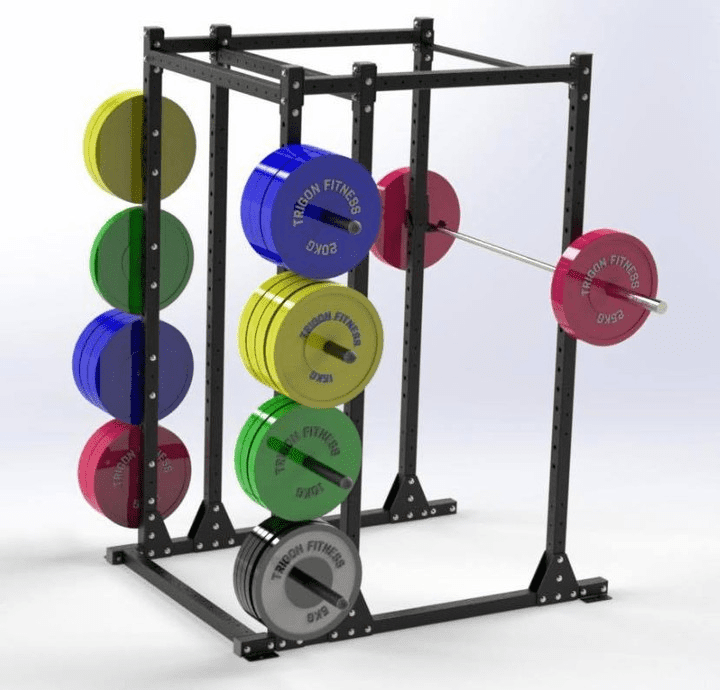
Designing and building a home gym is an exciting step in your fitness journey. An essential piece of any home gym is the squat rack. The problem is that with so many options, it can be hard to determine which rack fits into your space and routine the best. This guide will cover everything in the world of squat rack dimensions to help you find the right rack.
Table of contents
Types Of Racks
Every one of these racks will keep you safe while you perform the basic power rack exercises. The differences really arise in terms of space requirements and extra capabilities.
Power Rack

A power rack (also known as a power cage or squat rack) is the largest option you could pick. Their cage-like structure makes it so that you can lift it within the rack itself. Power racks usually have dimensions that fall in the following ranges:
Length: around 36-72 inches
Width: around 50-60 inches
Height: around 82-102 inches
If you have enough room, we always recommend a power rack due to its versatility. Thanks to the wide number of power rack attachments on the market, your power rack can be used for far more than the traditional barbell lifts. Here are just a few of the most popular attachments:
Pulley System (Cables)
Dip Station
Weight Storage Pegs
Furthermore, the sheer size and weight of the rack will make it like a stable platform for lifting no matter how heavy you go. It should also be noted that are some folding squat rack options available on the market.
Half Racks
Half racks come typically come in two forms. The first type is basically mini power racks that have a similar cage structure. So you can still lift within the rack but will have much less space compared to a power rack.

The second type is even more compact. These will have 2-4 posts but no space between the posts to allow you to lift in the rack. These additional posts are meant for added stability or storage. Half racks usually have dimensions in the following ranges.
Length: around 34-60 inches
Width: around 50-60 inches
Height: around 75-102 inches
Squat Stands

Squat stands are very minimalist racks. You can think of a squat stand as basically just two uprights with maybe a pull-up bar across the top. These do not offer much in terms of storage or attachments but you can still perform all the basic exercises safely as long as you get some safety bars. Squats stands have the following dimensions:
Length: around 48-52 inches
Width: around 48-52 inches
Height: around 72-93 inches
Wall Mounted Racks

Out of all the options, a wall-mounted rack is by far the most compact option. Since these racks are using your wall for added stability, they do not need to have as large a platform. Also, some wall-mounted racks are designed to be able to be folded. Meaning that will simply take up a small area when not being used. Wall-mounted racks have the following dimensions:
Length: around 20-30 inches
Width: around 48-52 inches
Height: around 72-93 inches
Additional Space Considerations
When looking at how much space you have to work with in your garage gyms, you have to keep a few additional things in mind when looking at squat rack dimensions online.
It is always better to plan carefully and play it safe than to have to return your rack and redo your whole garage gym design.
Barbell Width
Most racks are about 48 inches so your 7-foot barbell will require some additional space. Not just for the barbell itself but also so you can comfortably rack and unrack weights from the bar.
Plate Storage
When thinking about your home gym, you want your weight plates to be easily accessible. Therefore, you should plan ahead and dedicate some space to plate storage whether it be in the form of pegs or racks.
Overhead Clearance
If you are taller and planning on lifting anything overhead, you want to make sure you have enough room to do so without bashing your roof.
Additionally, if you plan on doing pull-ups make sure that you have enough room above your rack to do it without hitting your head on the roof.
How To Pick A Squat Rack For You
When it comes to picking your rack, you should first find out what is the most space you can dedicate to your gym and go from there. If you have the space, we always recommend opting for a full-on power rack. Even if you are just planning on using your home gym for the basics, it is always better to have the option to expand.
With a power rack, you can actually save space and money down the line. If the day comes that you want to do dips, lat pulldowns, or t-bar rows all you have to do is buy an inexpensive attachment and set it up on your rack. No need for extra space or extra machines.
If you truly cannot do not have the space or money for a power rack, then I would suggest going for one of the smaller options like a folding rack or squat stands. Picking the right size rack is all about working with what you have available.
Why Do I Need A Squat Rack?
The purpose of squat racks is to allow you to lift safely. Essentially the rack positions the bar for you to start your lifts and prevent you from hurting yourself in the case that you miss a lift.
As an example, you can set up a rack so that the barbell is at the perfect height for you to lift off while also having safety arms at your chest level to prevent you from breaking a rib if you fail.
The fact is that the squat rack and barbell are the two most versatile pieces of gym equipment out there. I consider them to be “must-haves” in the world of home gyms.
Final Thoughts
Squat racks are usually the most expensive and important choice you make when kitting out your home gym. If you have floor space, you can never really go wrong with a full-size squat rack. The versatility and durability are just too advantageous.
However, as home gyms become more and more popular, manufacturers keep finding ways to make racks more compact. Whether it be a folding rack or squat stand, there is something out there for most people.
FAQs
What if I cannot afford a squat rack?
A squat rack is a worthwhile investment if you can afford to save up for one. However, you always have the option of building your own squat rack for fairly cheap.
How much space does a squat rack need?
It depends on which type of rack you get. Most racks will be around 48 inches wide, 90 inches tall, and about 60 inches long. This can be drastically reduced if you get a smaller squat stand or half rack.
What height should a squat rack be?
Most squat racks are about 72 inches – 102 inches tall.
Michael Kirkland, is a trusted fitness expert and founder of FitDominium. With his extensive experience and commitment to helping others, Michael is the go-to source for reliable fitness advice and recommendations.
